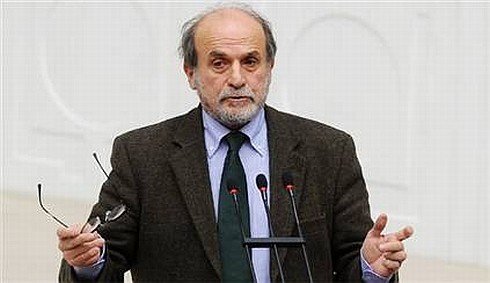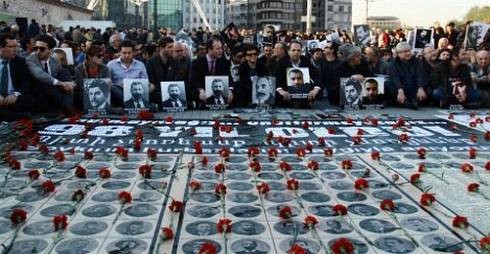Kürkçü: We Will Unfold Medz Yeghern Reality


Peace and Democracy Party deputy Ertuğrul Kürkçü delivered a speech at the Parliamentary Assembly of the Council of Europe on Wednesday - which marked the 98th anniversary of Armenian Genocide – saying that they were determined to unfold the historical realities pertaining to Medz Yeghern and make them public knowledge.
Kürkçü reminded the incognito arrest of 240 Armenian opinion leaders, including parliamentary deputies under orders by the then ruling İttihad ve Terakki Party government on 24 April 1915 in Istanbul. “Shortly the number of arrests reached 2,345, 761 of whom lost their lives in Central Anatolia where they were deported without any legal prosecution and court decision,” he said.
Saying that Armenian subjects of the Empire were forcibly deported to the deserts of Syria under the irrelevant pretext of counter-insurgency measures and first world war necessities, Kürkçü continued as follows:
“The defenseless convoys of women, children and elderly ended up nowhere, hundreds of thousands of innocent people were annihilated, finally depriving Eastern Anatolia from one of its autochthonous peoples, leading to the devastation of dozens of cities and towns which lost their essential human resources, productive powers…
“I would like to express our condolences in the name of our group to the grandsons and granddaughters of the victims of the Metz Yegern, the Great Crime, as the Armenian people name this heinous crime against humanity.
“And I would also like to express that we in spite of official obstacles are determined that the historical realities pertaining to Medz Yeghern will be unfolded and become public knowledge, provided freedom of expression and freedom of conscience is rooted in Turkey. This is essential for relieving the new generations of the distorted narrations of the past and establish mutual understanding and construct new ways of communication for reconciliation and refraternization between the Kurds, Turks and Armenians, all of whom have suffered from atrocities, massacres, deportations, exiles essentially caused by the partitioning and repartitioning of the world and regional spheres of influence between the great powers in the 19th and 20th centuries.
“Yesterday, across Turkey in Istanbul, İzmir, Ankara, Diyarbakir thousands of demonstrators, Turks, Kurds, Armenians, grandsons and granddaughters of both the aggressors and the victims of the past centuries altogether commemorated the victims of Medz Yeghern and without considerable official impediment, and with relatively bigger media coverage.
“We would like to welcome this attitude as a sign of the establishment of a broader understanding in Turkey for a discussion of the past freed from prejudices and hatred.
“We would also like to express our expectations that the ongoing talks between the PKK leader Abdullah Ocalan and Turkish government officials leads to a conclusion of the armed conflict in Turkey, which we hope will bring Turkey to the verge of a full democracy where differences will be welcomed as a source of richness and not a conflict.” (EKN/BM)



